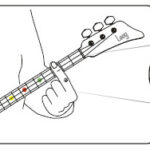The question of whether you can plug an electric guitar into a bass amp often arises among guitarists. Technically, the answer is a resounding yes. Connecting your electric guitar to an Electric Bass Guitar Amp won’t cause any damage to your instruments or gear. However, the more pertinent question is whether doing so will yield a sound that meets your musical needs and preferences.
The sonic outcome of playing an electric guitar through a bass amplifier is multifaceted, largely dependent on two primary components: the amplifier itself and, crucially, the speaker cabinet. While some might hastily dismiss bass amps for guitar as unconventional, understanding their characteristics reveals interesting possibilities, particularly for guitarists seeking specific tonal qualities.
Bass amplifiers are engineered with a different sonic objective compared to guitar amps. They are designed to amplify lower frequencies cleanly and powerfully, handling the substantial low-end output of bass guitars without introducing unwanted distortion. This design often results in a sound that is exceptionally clean and transparent when used with an electric guitar. For players who favor pristine clean tones or rely heavily on effects pedals for their sound coloration, this inherent clarity can be advantageous. The ample headroom in a bass amp means it can amplify the guitar signal without breaking up, providing a solid foundation for pedals to shape the tone.
However, the speaker cabinet arguably plays an even more defining role in the overall sound. Guitar speaker cabinets typically employ 12-inch speakers, a standard size that contributes significantly to the characteristic sound of guitar amplification. In contrast, bass cabinets commonly feature speakers ranging from 10-inch to 15-inch and even larger configurations. These larger speakers are designed to reproduce the lower frequencies of a bass guitar, and they impart a distinct sonic signature when used with a guitar. A cabinet with a 15-inch speaker, for instance, will generally produce less high-end sparkle and a more pronounced low-end response compared to a cabinet loaded with 10-inch speakers, which tend to offer a tighter, more focused sound with less deep bass rumble.
Personal experience can further illuminate the potential of this setup. One guitarist, for example, found great satisfaction playing a Telecaster through an Orange Bass Terror 500w head paired with a 2×10 neodymium bass cabinet. This combination yielded a sound that was described as exceptionally pleasing, particularly for clean styles like jazz and country. While it might not naturally produce heavy distortion, the clean foundation proved to be an excellent platform for pedals, demonstrating the versatility of a bass amp in a guitar context. This experience highlights that while unconventional, using a bass amp for electric guitar can open up new sonic avenues, especially for guitarists who prioritize clean tones or utilize pedals to craft their desired soundscapes.
In conclusion, while traditionally distinct, the realms of electric guitar and bass amplification can intersect creatively. An electric bass guitar amp can indeed serve as a viable option for guitarists, particularly when seeking clean, pedal-friendly tones. The key to unlocking the potential lies in understanding the characteristics of bass amps and, most importantly, the significant influence of the speaker cabinet in shaping the final sound. Experimentation remains the most valuable tool in a guitarist’s arsenal, and exploring the combination of electric guitar and bass amp can lead to surprisingly rewarding sonic discoveries.

